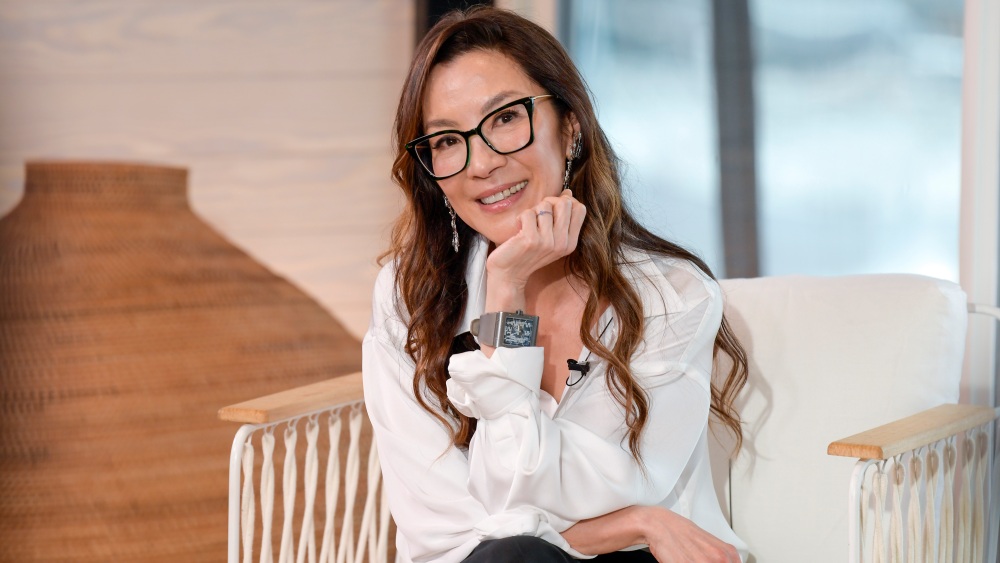Michelle Yeoh Rejects ‘Everything Everywhere’ Sequel
After an illustrious four-decade career, Michelle Yeoh finally became an Oscar-winning actor just two months ago for “Everything Everywhere All At Once.” Yeoh says Asian performers were ignored for far too long, but she is hopeful for the future.
Speaking during the Kering Women in Motion talks at Cannes, Yeoh reflected on the first time she came to the prestigious festival with “Crouching Tiger, Hidden Dragon” more than 20 years ago.
Yeoh says “it’s quite obvious” that Hollywood was not ready to recognize Asian actors at that time. The Ang Lee film was a box office success, making more than $200 million worldwide and garnering 10 Oscar nominations, including best picture, best director and screenplay. But none of the actors were nominated.
“There were so many great Asian, Chinese movies that came out at that time,” Yeoh said. “But if you look at all the films that get nominated here in Cannes and get awards, very rarely, especially at the Oscars…they would nominate best director, best film, everything. You wonder how do you get there without the actors? So, it seems a little odd.”
Yeoh continued: “When ‘Crouching Tiger’ came out, people were saying, ‘No one in America will watch this film because they don’t know how to read subtitles.’ But guess what? Americans do know how to read.”
Yeoh says the success of “Everything Everywhere All At Once” is proof that diverse storytelling should be embraced, and that audiences are interested in new ideas.
“It’s just a matter of pushing the envelope and refusing to say that this is the ‘normal way.’ In the ‘normal way,’ would ‘Everything Everywhere All At Once’ would have been nominated? Chances are no, five to ten years ago,” Yeoh says.
When “Crazy Rich Asians” became a global success in 2018, Yeoh says Hollywood executives finally paid attention. But if “Crazy Rich Asians” didn’t turn a profit, she says, “I wouldn’t be sitting here today.” Yeoh spoke about the double standard in the entertainment business where men are given more second chances than women, even with financial failures.
“There are mega films that suffer terrible losses, yet they still go and keep doing the same thing,” Yeoh said. “It’s the studios thinking that’s their comfort zone: these movies, the budgets get bigger and they feel more violence, the more CGI will make it better — but the truth of the matter is it’s not. It’s really storytelling. In ‘Everything Everywhere All At Once,’ even though we traveled the multi-verses, the main theme was love.”
(For what it’s worth, Yeoh reveals there won’t be a sequel to “Everything Everywhere All At Once.” “There’s no sequel,” Yeoh announced during her talk with Variety at Cannes. “We would just be doing the same thing.”)
Today, Yeoh is seeing the most progress she’s witnessed throughout her entire career. “The best thing that has happened is I receive a script that doesn’t describe the character as a Chinese or Asian-looking person,” she said. “We are actors. We are supposed to act. We are supposed to step into roles that are given to us and do our job as best we can. That, for me, is the biggest step forward.”
As for that Oscar win, Yeoh says she hopes it’ll create a path forward not just for her to be able to negotiate for better pay and better roles, but for others.
“The most important thing it has done is it has generated such pride with our people,” Yeoh said, referencing the history-making side to her win as the first Asian actor to win the best actress prize, and only the second woman of color, following Halle Berry’s win in 2002. “The day I won I honestly heard the roar of joy that came from that corner of the world. It’s been slowly moving in that way and this has pushed the door open and it’s not shutting behind me…When there’s so few roles in the past it’s so competitive. If you get the job, I don’t get the job. But now we have to change the mindset. If I’m successful, you can be successful.”
Yeoh’s Oscar acceptance speech went viral after she said, “Ladies, you are never past your prime.” Most viewers took the line to be a dig at former CNN anchor Don Lemon (who has since been terminated from the network), who earned blowback in February for saying a woman is considered to be in her prime in “her 20s, 30s and maybe her 40s.”
Yeoh did not cite Lemon by name when asked at Cannes about the reference, but she did confirm she was referencing “some journalist who really put his foot in his [mouth] saying when you are 30 or 40 you are past your prime.”
“He tried to say it comes from Google or something like this,” Yeoh added. “But do we have to live our lives through what somebody else decides? Once your numbers get bigger, it’s really easy for things to shrink. There are less roles. I was always frustrated. Why do the guys in their 60s, 70s or 80s get to go out for these big adventures while I have to stay at home by the phone? No! It’s fighting for these kind of opportunities. Why can’t we do it? Mothers are just as fierce, if not more.”
Watch Yeoh’s full Kering in Motion talk in the video below.

